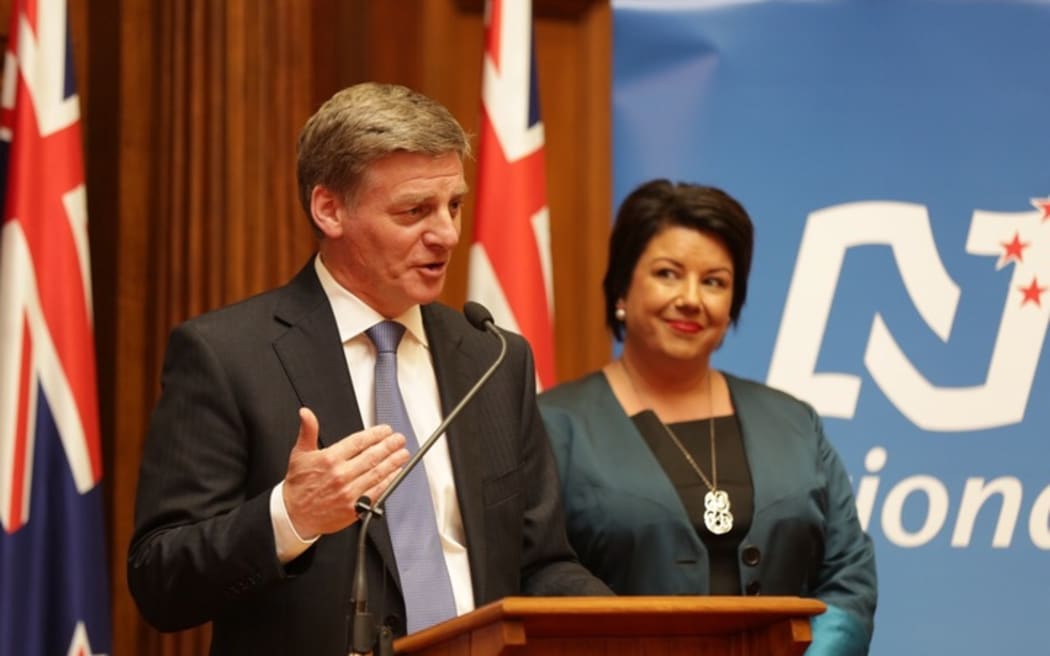We ask political commentators Ben Thomas, Carrie Stoddart-Smith and Stephanie Rodgers what to expect now that there's a new prime minster in the House.

Bill English and Paula Bennett Photo: Rebekah Parsons-King/RNZ
Today the first episode of the Bill and Paula Show aired on our screens. Many people thought it was going to be boring as hell.
Bill English is now set to go head to head with Andrew Little in the most boring political race in ten thousand years.
— Megapoopolopolis (@Megapope) December 8, 2016
But English prefers to use the word “steady” to describe himself.
Is Bill English boring? 'I like to think I'm steady' https://t.co/lCY77T8Eh6'
— Brent Edwards (@rnzbrentedwards) December 8, 2016
Which is kind of another word for boring, really.
“Critics have sneeringly called it 'continuity with change', the satirical slogan used by Veep and also by Malcolm Turnbull,” Exceltium PR consultant Ben Thomas says of our new leaders.
“But that ignores the context.
“National is polling extremely highly and before John Key announced his resignation, there was no clamour for change, especially against a backdrop of Brexit and Trump.”
So no change then?
Not really, says Thomas.
“The government’s direction was largely set by English over the past eight years anyway.
“He managed the books for the economy, but also directed social policy, including welfare, education and housing. In this sense, having Bennett as his deputy re-unites the old firm that was so successful in social development reform in the first two terms.”
Bill English, the new prime minister, has just announced that Paula Bennett is a woman.
— Toby Manhire (@toby_etc) December 11, 2016
In a similar vein, Carrie Stoddart-Smith, a commentator politically aligned to the Maori Party, says her intuition suggests to expect more of the same from the new leadership duo, at least in terms of National Party policy.
“Incrementalism dies hard.”
Trade unionist Stephanie Rodgers is also expecting more of the same, with a bit of "superficial change" and some "big shiny numbers" like the "$25 a week" benefit increase.
"English isn't going to rock the boat - I hope. But he does have a chance to tell a great story by sitting down with the Pike River families and dealing with them fairly over the re-entry of the mine," Rodgers says.
So, English isn’t going to ban abortion, reverse the Marriage Amendment Act and send us all to prison for smoking weed - even if we don’t inhale?
"Personally I'm worried about access to abortion," Rodgers says.
"A lot of people don't realise it's still a crime in New Zealand, and there have been repeated legal attempts by groups like Right to Life to narrow access even further.
"Having a conservative Catholic PM will probably embolden those groups and make it harder to get any traction on updating our outmoded, unworkable abortion laws."
Thomas says any kind drug liberalisation will stay firmly off the agenda under English and Bennett, and Stoddart-Smith agrees.
“English’s social conservatism … and the fact that drug testing beneficiaries was a Bennett policy, signals antiquated views from both on drug reform. The duo might produce surprising results, but without Key, National will want to play it incredibly safe to see a fourth term,” she says.
But despite being well known for his conservative Catholic background, English signalled (again) today that his religion would not shape his politics: “It's been an influence in forming my judgement, forming my conscience ... I recognise that other people have different sets of beliefs ... It doesn't define me," he said.
He also appears to have changed his course ever so slightly towards supporting marriage equality.
"Just seeing the impact it's had for couples and the fact that it doesn't hurt marriage, in some ways it's an affirmation of the concept," English said at a press conference today.
This is after consistently voting against anything that deviated from heterosexual marriage in the past.
“He’s a kind of classic conservative in that respect,” Thomas says.
“Believing what we have just at the moment is about right, whatever that happens to be, but [not wanting] it to go too much further.”
“We won’t see any of kind of Trump-like effect, rallying the forces of social conservatism into direct action or hate crime. He isn’t the kind of politician to play on people’s fears or insecurities.”
See:
Obama just endorsed Crooked Hillary. He wants four more years of Obama—but nobody else does!
— Donald J. Trump (@realDonaldTrump) June 9, 2016
Versus:
A good surplus warrants a good pie #steakandcheese pic.twitter.com/3n5OqfGaTO
— Bill English (@pmbillenglish) October 13, 2016
I suppose that’s a good thing. But there must be something interesting that could come out of this. What’s Winston Peters up to? Still pointing at that sign?
The picture and sign @ #Kaitaia butchers shop sums up National...A load of bull and pork specials.#SendThemAMessage pic.twitter.com/Cil0qnvTJm
— Winston Peters (@winstonpeters) March 18, 2015
Thomas says Peters’ opportunity now is that without Key’s trademark ability to reassure the electorate, his “message of looking-inward and fear” may get more traction, particularly on race issues and immigration.
“Meanwhile, Act will have more room to carve out a niche on the right as social and economic liberals,” Thomas said.
Stoddart-Smith says those not keen on the slow, incrementalism of English but who sit assuredly right, may gravitate toward ACT, which could, if David Seymour holds Epsom, help ACT bring in another MP.
“For NZ First, it signals a potential openness to a coalition – an openness that did not exist under Key.”
Rodgers says there's a gap in the narrative for Labour, which they could fill with an inspiring, progressive vision of New Zealand to stack against National's same-old same-old.
"Winston will win hugely if English keeps letting there be discussion about raising the super age.
"ACT is a bit of a joke, and as soon as the math doesn't make it worth gifting Epsom to David Seymour, they'll be out," she says.
Ok. What about party personnel? Is English going to change ANYTHING AT ALL?
Thomas says some of English’s loyal allies have passed their used-by date with the public, but more importantly with the newly assertive National caucus. The most notable of these characters is “political trash fire” Nick Smith, English’s bestie.
“English will need to promote talented young ministers like Simon Bridges and Nikki Kaye, as well as a few of the backbench leaders from the past week such as Todd Muller and Mark Mitchell.
“This means firings, including the Old Yeller scenario above.”
What about all this talk of swallowing dead rats then - that sounds gross / interesting.
“Key promised he’d quit if he ever raised the superannuation age – part of swallowing 'dead rats' in 2008 – along with keeping working for families, interest free student loans and Kiwisaver,” Thomas says.
“In this metaphor, though, superannuation is a rat that is still alive and has been feeding off scraps and growing bigger over the past eight years, and is set to burst out in horrific and spectacular fashion in the future.”
Amazing.
“English knows better than anyone how pressing the need for reform is and he has the advantage that this government is still trusted by voters in a way that was lacking before 2008.”
National’s performance to date on superannuation, housing, and poverty indicates there is not really an appetite to bring radical change in any of these areas, Stoddart-Smith says.
“To avoid slipping further into Labour territory, National will likely tinker, but not introduce anything revolutionary. If they need NZ First to be waiting in the wing, they will steer well clear of superannuation.”
Ok and the question that’s on everybody’s lips: Will I now be able to afford a house in Ponsonby, or do I have to cancel Sky, sell my BMW and have Marmite instead of smashed avocado on my toast?
“We might see some movement around property type taxes, as part of the undeniable solution to addressing housing. However, National’s tax story will also speak to the need for any new taxes to be offset by the tax cuts English has promised to ‘middle NZ’ for some time,” Stoddart-Smith says.
While Thomas says Steven Joyce appeared on TVNZ’s Q+A on Saturday saying housing policy could be “reviewed”.
“The government won’t want to do anything to seriously affect prices in the short term, but short of a capital gains tax it probably can’t. They remain implacably focused on the supply side, so Joyce may have been signalling greater steps to use government funds for building projects,” Thomas said.
Another interesting point, Stoddart-Smith says, is Bennett's appearance on Māori media yesterday.
Bennett is positioning herself as National's Māori representative, she says.
"Whether she intends this to provide a level of distancing from Māori Party (that is, leaving room to cull them if needed) or to signal to the 'I’m not racist but…' crowd that the iwi vs Kiwi trope will not take root during her tenure will be an interesting element to watch."
She said it was possible that English's conservatism had softened towards Māori.
"After all, on many occasions, he has endorsed Whanau Ora and has spoken positively of his stable and mutually respectful relationship with the Māori Party.
"What will be interesting is that any coalition deal with NZ First could potentially see Whanau Ora on the chopping block. Indeed, it may give English cause to revert to his conservative instincts."
Rodgers reckons Bennett's got what it takes to make up for what English lacks in charisma.
— Robert James Stewart (@RobJStewartNZ) December 12, 2016
"I would expect Paula Bennett to take a bit more of a public role than is usual for Deputy PMs.
"Bill English said himself he's not much of a showman, and John Key's going to be a hard act to follow. Paula Bennett has the rags-to-riches story, the flamboyance and the profile to take over those jokey breakfast radio spots," Rodgers says.
***
Ben Thomas (@BenThomasNZ) is a public affairs consultant with Exceltium in Auckland. He worked as a press secretary to the Attorney-General and Treaty of Waitangi Negotiations Minister Hon. Chris Finlayson for six years in the John Key government, and is a former political editor of the National Business Review.
Carrie Stoddart-Smith (@Ellipsister) (Ngapuhi) has an LLM (Hons) and currently works in Wellington, lives in Auckland. Earlier this year, she published a chapter on Radical Kaupapa Māori Politics in Morgan Godfery (ed) The Interregnum (2016).
Stephanie Rodgers (@bootstheory) is a trade unionist, campaigner and communications advisor who blogs on feminism and leftwing politics.


